Toxic chemical spill poisons Duzi River, ruining lives
An accident at the Willowton Oil plant has poisoned the river, causing the death of a herder and livestock as well as fish, and depriving residents of their water source.
Author:
5 September 2019

Instead of celebrating his birthday, Tieho Semethe died. He was trying to stop his herd from drinking heavily contaminated water from the Duzi River in Mboyi Village in KwaZulu-Natal on 15 August 2019. The father of two drowned within just a few hours of turning 28, buried in his hometown in Lesotho on 24 August.
The incident happened two days after 1.6 million litres of fatty edible oils and caustic soda poured out of the Willowton Oil Mills in Ohrtmann Road into the Baynespruit and Duzi River, just below the N3. The poisoned water ran as far as Cato Ridge and the Umgeni River, which flows into the Inanda Dam.
The spillage, which has been described as the biggest in 30 years, occurred when a vegetable oil storage tank collapsed and, in the process, brought down an adjacent tank, the company said in a statement. Two other tanks were slightly damaged. One contained sunflower oil and the other diluted caustic soda, which is used in the manufacture of laundry soap. The Willowton Group produces well-known brands such as Sunfoil Sunflower Oil, D’lite Soya Bean Cooking Oil, NuVolite 50% Fat Spread and Britelite Candles, among other products.
While Semethe’s efforts were in vain, his employers now want answers as to who will accept and pay the costs of not only the loss of a life but also of the loss of livestock, upon which the impoverished community depend.

Who will help now?
Upstream near Pietermaritzburg, the surfacing of dead fish signalled that something had gone horribly wrong. Downstream, many poor communities depend on the river for washing, cleaning, swimming and drinking. This is where the devastation was most felt.
Mtshengiseni Ndawonde, 66, the local induna under Inkosi Nhlakanipho Maphumulo, said Semethe had been working for him for about two weeks before meeting his untimely death.
“He was a very smart boy … The reason I hired him is because I know the value and importance of a cow and sheep,” said Ndawonde, who owns 16 cows and about 40 goats.
Recalling that fateful day, Ndawonde said he was visiting his in-laws when he got a call at around 4pm. “‘Msuthu has gone into the river,’ that is all that was said to me. I asked if Semethe had resurfaced, and he said no.”
Ndawonde immediately left Maqonqo and went back to his house, which is situated close to the Mboyi Bridge under which the Duzi River flows.
Related article:
“When I got there, there were gumboots on the edge of the river and a shawl that he was wearing that day. Close to the items, along the pathway, there were dead fish all over.”
Ndawonde, who could swim, took off his shirt but then changed his mind about jumping into the poisonous river to look for Semethe.
“So together with the inkosi we called the police who came with divers and the K9 unit. Unfortunately, because the police feared for the dogs, they told us that they would come back the following morning to help us search for him,” said Ndawonde.
On 16 August, there was an indescribably strong stench that engulfed the community, presumably coming from the dead fish. “The police went in to search for his body and within an hour, they told us to call the mortuary. When they pulled him out, he was bleeding through the nose and his skin had turned purple. That was the last I saw him. I was very hurt.”
Ndawonde said people have been reporting the loss of their cattle since the incident. He tried his best to caution the community not to eat the dead fish as they may become poisoned.

“Losing Semethe breaks our heart because it feels like we have lost a member of our family. My question to the Willowton Group is, who is going to compensate the families who’ve lost their livestock. People also want answers from me. I want to know who will compensate me for helping to bury Semethe?”
Ndawonde’s wife, Thembisile, said she was angered about the disregard for the loss of human life and the livelihood of the poor.
“Willowton must take responsibility for his death because he was someone’s husband and a father of two children. Who is going to help them now? A person has died, and it breaks my heart that we are talking about the environment, the fish and the cattle. He died because he was trying to help the cattle. He would have never died if the water was not poisoned,” she claimed. While Ndawonde strongly believes that Semethe drowned trying to save his cattle, it has also been reported that he was trying to catch the dead fish.
KZN police spokesperson Colonel Thembeka Mbele confirmed that the Pietermaritzburg Search and Rescue Team recovered the body of a male who drowned in the river in Mboyi on 15 August. An inquest docket was opened at Bishopstowe police station for investigation, said Mbele.

Missing cattle, sick dogs, dead fish
Nomangwane Ngidi, who lives in Ophokweni, a section just beyond kwaXimba, said while she agrees with Ndawonde that the loss of life was far more important, she is extremely stressed by her dwindling cattle stock. She has 21 cows, which are used for meat during traditional ceremonies at the family home.
“The river was white as snow. This is the same river that our children play in, sometimes when there is no [running water from taps] we use it to wash clothes and the cattle drink from it.”
Just by looking at the water, the grandmother of 16 could see that the chemicals in it were deadly. “The fish were floating on the river, some were washed out onto the banks of the river and some kept flowing in the direction of the river. By the time people across the river shouted: Nazi izinkomo ziphuza amanzi. [Here are the cows drinking the river water.] But it was too late for my family. Some of my cows had already drank the river water.
“Three cows and one goat is missing. This morning one, Spencer, was lying on the ground. I am worried because she is pregnant, and she was bleeding through the nose.”
Related article:
Ngidi is aware that her other cows might be dead. She also fears that her six dogs, which ate dead fish, are not looking well. “Habe! Inkomo zami. [There are my cows.] Of course, I am worried. What also makes me sad is that my two sons used to participate in the Duzi Canoe Marathon, and they were good athletes. My grandchildren have also taken up canoeing because of this river.
“Look now, the river that brought us joy has brought us a curse. It hurts because this river is the livelihood of this family.”
In Mpushini Valley in Ashburton, just outside of Pietermaritzburg, Heather Poulsen, 63, tears up. “Within hours of the spillage, the fish were jumping out of the water because they were burning. It is like putting your hand in acid. I could see we had a disaster.”
While taking a stroll on Furrowvale Farm, Poulsen was suddenly overwhelmed by the strong smell of dead fish. “What makes my heart really sad is seeing the little fires along the river where the poorer communities have come to get their meal.”
Call for an investigation
Water specialist Anthony Turton from the Centre for Environmental Management at the University of the Free State is calling for a thorough investigation. “The company is a serial offender and has a long history of noncompliance, which is why this needs to be investigated. We firstly need to look at the crucial current compliance status, particularly when it comes to use of the water licence.”
The second part of the investigation, Turton said, should look at the full impact of the disaster to determine the long-term effect on the soil, which has been damaged by the irrigation with emulsified oil. “This incident is also about the cost of the loss of livelihoods and not just about the cost of rehabilitating the river,” said Turton.
Msunduzi Municipality spokesperson Thobeka Mafumbatha warned that the river was still a no-go area. “The public is warned to refrain from using the water for various purposes including drinking, washing dishes and clothing, irrigation, retrieving dead fish, swimming, fishing and canoeing.”
Related article:
Mafumbatha added that most solids in the river had been recovered and pH levels had been stabilised. “The clean-up crews are working from Pietermartizburg to Inanda Dam to recover the fish. The colour of the water has also normalised. However, aquatic organisms have been severely impacted and environmental studies are being conducted regarding the extent of the damage.”
Mafumbatha added that the visible foam, which occurs as the oil fats separate in the water, has almost totally been contained and removed. All manufacturing processes at the plant have ceased until further notice.
“In addition, the Willowton Group has enhanced their efforts by engaging with the Gift of the Givers for the distribution of bottled water, Jojo tanks as well as water tankers. All containment and rehabilitation costs are borne by the Willowton Group.”
Provincial MEC for Economic Development, Tourism and Environmental Affairs Nomusa Dube-Ncube, through her spokesperson Nathi Olifant, said the department was still awaiting the outcome of the investigation into the circumstances that led to the incident.
“The offender, which is Willowton Oil, as required by the law, contained the impact, remediated and reported as required when such incidents occur. If it’s found that any violation or negligence on the part of the offender which led to the environmental damage [has occurred], we will take necessary steps as guided by Section 30 of the National Environmental Management Act,” said Dube-Ncube.

The guilty party
The Willowton Group said the Msunduzi River and Baynespruit tributary and banks have been cleared. A team of external specialists have been retained for both the investigation and environmental remediation. It said it had ensured that communities reliant on the river were provided with water.
The group denied that it was a serial environmental offender. “Willowton retains the highest safety and environmental standards and subscribe[s] to the relevant industry audits and all required operational inspections are conducted regularly by independent bodies.” It remains unclear why the accident happened in the first place.
The company said that while there have been allegations of death of livestock, there was no direct evidence to prove this. “We received one report related to concerns that a cow had died due to the water quality. An autopsy was done, and a full veterinary report supplied in which it was determined that the animals died from advanced PEM (protein energy malnutrition), a common nutrient deficiency seen in the middle to the second half of winter when grass is nutrient poor, and cattle struggle to maintain condition. The vet went on to further assess many cattle along the river’s edge and none showed any signs of illness or disease.”
When asked about Semethe’s death, the Willowton Group recommended questions be directed to the relevant authorities, adding that they had not received any details.



